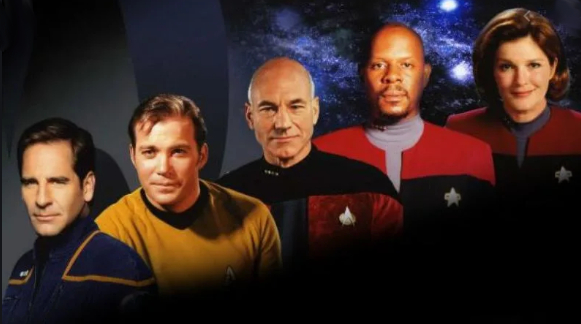The Spiritual War Through Culture: Modern Entertainment
The point of this post is to build on what I already talked about concerning the spiritual war through culture in Bible times in a previous post and do a brief comparison and contrast. How is our world different from the past? And especially, what role has speculative fiction in particular played in the modern spiritual war through culture? What kind of spiritual influences are working their way through our culture in its entertainment especially? What should we be concerned about? (Note I use Star Trek as my primary example.)
Technology Has Made Entertainment Ubiquitous (of course)
Let’s state up front, as obvious as it is, that while human beings have always taken times of rest at various moments, have always played games (especially games that involve throwing or kicking objects or moving pieces on a board), and have always enjoyed music and hearing stories, our era is unique in human history. Sure, the lives of the elite in, say, ancient Rome (and many other places) could in fact consist of unending entertainment, from theater to chariot races to gladiatorial games and much more. But even in ancient Rome there was downtime where the games were not playing. And most people in the past did not live like the ancient elites. Most people spent most of their awake time working.
Labor-saving devices of the 20th Century changed the dynamic of most people working most of the day. Having time off became a normal, daily experience for most people. Though most people spent that time off with friends and family more than in formal entertainment. At least at first.
But now, on a small, portable device called by most people a “phone” for historic rather than descriptive reasons, this little pocket computer can provide you entertainment at any moment of the day. It can also provide you information at any moment–yes, a lot of the info is actually misinformation, but still, the access to media in our world is unprecedented. And is not limited to elites. Though of course access to media is by no means limited to cell phones or other mobile devices.
I’m in a unique position to have witnessed some of the effects of this transformation in technology through my military service. As a relatively young Private First Class during 1991’s Gulf War, I witnessed what a US Army Reserve hospital unit did during downtime. Some of the time was spent playing sports–volleyball in the sands of our isolated corner of the United Arab Emirates was popular. Other time was spent socializing with others. Some people like me read from the meager library of books the 311th Evacuation Hospital had. Lots of people played cards. A lot. Even me, sometimes.
In 2008 in Iraq for my second war, the world had changed. Most military members in rear areas had personal laptops and seeking relatively hard-to-come-by connections to the Internet had become the norm. Military members still socialized of course, but much less than in the past. You could always retreat to an isolated spot and try to contact the family back home via Skype. Or play on a gaming counsel or computer. Or, as many people did, you could binge watch TV or movies (though back then you’d need physical copies of DVDs to do so). (In theory binge-watching was possible in 1991 via VHS, but in practice it was not. Military members could not haul around their own TV, video player, and video cassette collection. But a laptop with DVDs was doable.)
The effect of the change of technology was obvious–people you know in person became less important, whereas entertainment in general, fictional stories in particular, became more important. And while a laptop was revolutionary in terms of access to information circa twelve years ago, having the same power to consume entertainment via a phone is even more portable–while simultaneously even more isolating.
What Would Satan Do (WWSD) With Ubiquitous Entertainment…?
So if people are spending a lot of time consuming entertainment, many more hours per week than almost all residents in ancient Rome would ever dream of doing, how would Satan react to that? Would he be lassiez-faire concerning what human beings do–let them do as they wish, and we’ll see how it all plays out? Or perhaps even an avoidance of the subject of entertainment, because it reflects God-given creativity and therefore the holy glow of sub-creation will cause Satan to avert his eyes from human imaginative endeavors?
Or did Satan actually think, “If I get in here, I’ll control every idea these people are exposed to!” (Uh huh–yeah–that there.)
Of course Satan doesn’t or can’t control everything, but the idea that he would try to influence human beings to insert messages that serve his purposes into entertainment is such an obvious idea that Satan would have to not be who the Bible portrays him to be to pass by such an opportunity.
Okay, so the Devil is messing with the elements of our culture, especially popular culture, as much as he can possibly influence human beings to perform on his behalf. What does that mean for us? What do we do about it?
The topic of what to do about this is the intended subject of my next post, the last one planned for this series. But let me give you a special showing of most of what I’m going to say right now: Be alert to the possibility and consume entertainment with prudence, deconstructing false messages. Also–fight for better entertainment. (I do not say to withdraw from everything that may be potentially bad–because that would include everything!)
So WWSD thinking reveals that every form of entertainment has numerous potential pitfalls, since human beings are so vulnerable to falling into sin and believing ideas that isolate them from God. Some forms of entertainment are blatantly promoting ideas Satan approves of–pornography, for instance. Basketball and other sports are not as obvious, even though the Devil would like to insert sinful pride and arrogance as a positive thing in sporting competition if possible. Most forms of entertainment are more like basketball–the potential to influence is there, so the Devil is definitely interested in affecting people–but the affects are not always as obvious as with the case of porn.
So what’s the Devil got to do with speculative fiction?
I’d like to focus on this topic a bit more for the next post, but let’s give an overview now. What general influences can we discern within speculative fiction that the Devil most likely has his hand in?
Probably the single most important thing that speculative fiction does that’s anti-God (thus pleasing to Satan) is to create imaginary worlds that systematically exclude God. So let’s look at a little case study here, deliberately picking a franchise that’s been one of my favorites since my childhood: Star Trek.

Characters from all the versions of Star Trek. Image source: Star Trek’s Facebook page.
Star Trek, throughout all its manifestations, has never once portrayed a Christian in the future. Not a single one. In fact, none of the human characters in Star Trek have any clear religious belief at all. Sure, Star Trek explores religious belief through non-human races like Klingons and Bajorans and at times makes reference to Christian religious beliefs (for example, Captain Janeway once made a comparison to making an agreement with the Borg to “a deal with the Devil”). But not a single human character has had any religion at all that I know of. (And I’ve seen all forms of Star Trek, every episode, except for the Discovery series.)
Couple that with an imagined future history of Star Trek in which humanity has eliminated wars and poverty on Earth and live in a virtual paradise, only having troubles out in space when dealing with alien species–which means a strong message about the value of religion is buried within the culture of Star Trek. And that message is that religion is unnecessary. Bad even. That it’s part of the violent past of Earth.
Do you suppose Satan approves of that message? And perhaps had something to do with it becoming a part of Star Trek culture in the first place? (WWSD?) He certainly would approve and probably helped to prod the series in that direction when given the opportunity to influence human beings.
So how should we respond to this understanding that Star Trek has messages the Devil definitely loves? Let’s look at three approaches–how “pearl-clutchers” would react, how “anti-pearl-clutchers” would react, and how a sensible person of Christian faith should react.
What would “pearl-clutchers” think we should do about Star Trek?
Ironically I don’t think the “pearl-clutchers” that I mentioned in last week’s post worry about Star Trek all that much. Mostly because Star Trek is generally clean fiction without cussing beyond mild forms, with violence but not graphic, with sexuality but not nudity. It’s just not on their radar. But if I could share with them the facts that Star Trek in actuality (as much as I have enjoyed it) is profoundly atheistic, their response probably would be pretty straightforward: BAN IT! DON’T WATCH STAR TREK AGAIN!
What would “anti-pearl-clutchers” do about Star Trek?
Well, first, scoff that there’s any negative influence there at all. Second, focus in on the general morality of Star Trek and focus on the very real positive aspects of altruism that Star Trek applauds. Also, look for those exceptional episodes where a Bajoran or Klingon who is a good character has a religious moment that strongly parallels Christianity–then read the Gospel into the entire franchise based on the exceptional cases.
What’s a realistic take on Star Trek?
Recognize that it’s art, that art is inspired by human beings. Humans are created in the image of God and the act of creation is good at its base. But humans can be and generally are corrupted by their own sin and are also influenced by Satan. So we can enjoy Star Trek, but we should look for messages we know are wrong there, so we can acknowledge them and confront them in our minds. We can also look for things that are good in Star Trek and mention those, too.
We can enjoy it, but we shouldn’t dash in hog-wild and uncritically lap up every single thing about it because we love the entertainment. If we are personally incapable of controlling ourselves in regard to our understanding of, or viewing of, Star Trek, perhaps we should ban it for our own self for our own personal well-being. Because, for example, maybe the shots the writers take at belief in God through Q really bother you and cause you to question your faith–whereas I shrug them off or find them a useful tool for discussing God’s actual nature. If your viewing of Star Trek is deeply affecting you in a negative way, don’t watch it. (Don’t worry if your friends think abstaining makes you uncool.)
And as Christians who create speculative fiction, we might want to use of the of the cool things Star Trek does, but adapt them for our own purposes, into something better.
Let’s do this exercise one more time: Harry Potter.

Harry Potter movie posters. Source: TVOVermind
Pearl-clutchers: SATAN WILL SUCK YOUR BRAIN OUT BECAUSE IT HAS THE WORD “MAGIC” IN IT! BAN IT!
Anti-pearl-clutchers: Scoff that there’s anything bad at all in HP. See Harry Potter as a type of Christ. Glory in the fact that in all the books there are two references to Scripture.
Realistic: The worst thing about Harry Potter the franchise is that like Star Trek, none of the characters are actually religious in the ordinary sense of the word. They may be moral, but God is essentially shut out of the story universe. Magic in the story is nothing like the practices that brought Elijah up Mount Carmel to confronting the prophets of Ba’al. But it’s nothing like prayer, either. Some small percentage of HP readers may seek to find out more about magic in real-world Paganism based on the series. A realistic response is to talk about what is good and also what is magic and that in the real world it’s bad to seek supernatural power apart from God. In other words, you can enjoy it, but back off a bit from being a full-out fan.
Literary Fiction Shuts Out God, Too
By portraying supposedly ordinary human beings as functioning in life with no evident need for God, literary fiction shuts God out as well. Usually. Mentioning that just in case you think I’m only picking on speculative fiction here. YEah and sports had negative influences. As does “reality” TV. Documentaries. Comedies. Well, lots and lots of things actually have negative influences.
Some things we ought to avoid altogether based on what personally causes problems for us. We also ought to be aware that other people can be affected by the things we do. But mostly, we can engage at times, but we should not do so uncritically. We can be fans, but admit not everything is perfect.
Shutting Out God is Just the First Thing
We also see in fiction and other forms of entertainment quite a lot of incentive to sin. Lust, envy, pride, wrath, particular sexual sins–you name it, these things are littered throughout entertainment and are in speculative fiction as well.
Entertainment is also littered with false ideas. Just one example would be Dan Brown suggesting Jesus was just a human being who got married and had kids in The Da Vinci Code. Those ideas are part of the spiritual war we are in, means by which Satan is trying to influence our world.
So overall, in parallel with how the cultural war reflected spiritual war in Bible times, we also need to be aware that Satan is active in influencing modern culture. If something creates major problems for us personally in our relationship with God, we should avoid it. If we can enjoy the creative aspect while still pointing out messages that are wrong, we are permitted to do that. But if we can use the same artistic forms, such as the literary genres of speculative fiction, and make our own versions of them with the intent to honor God as much as possible–all the better.
Of course, God is not honored by us ignoring quality of art, including quality of speculative fiction stories. He as the Creator expects our best work…
What are your thoughts on this topic? Do you think my views on the Star Trek and Harry Potter franchises are fair? Can you give your own examples of realistic analysis of a speculative fiction franchise that acknowledges both good and bad?










































What Would Space Dad Do? (Space Dad is Sisko.)
(Space Mom is obviously Janeway. I would call Kirk Space Cowboy except Spike Spiegel already has a trademark on that. I’m not sure if Picard is Space Bachelor Uncle or Space Professor of Philosophy. I generally refuse to acknowledge Enterprise’s existence as canon, but I hear there are some good things once you overlook Space Trashbag.)
Picard is Space Diplomat.
Kirk has been called Space Cowboy for decades, so I’ll still use it unofficially in my description of him.
Archer is Space Explorer, later seasons of Enterprise got better.
STD is awful, and despite having watched the entirety of both seasons I’m completely forgetting the main character’s name. I can’t even think of a good descriptor for her because she’s horribly written, the whole cast is.
Sorry to hear Star Trek Discovery is awful. I haven’t seen it, but my understanding is the cast features the first openly gay couple in Star Trek history. Of course, including a gay couple [Travis switches to clumsy, little-practiced sarcasm] would have NOTHING to do with any kind of social agenda and of course Satan has no interest in whether human beings accept sinful social agendas or not. It’s all a coincidence. Nothing to see here, citizens–move along!
What would Notleia do? Say something flippant meant to be clever, than has little bearing on the actual topic and which truthfully merits the old-time scornful term of “sophomoric,” as in the attitude of someone who has obtained some knowledge, though is far from an expert, yet acts with arrogant confidence.
This is not the same, actually, as the Kruger Dunning effect, which is caused by knowing basically nothing. You know things–but not as much as you think.
WWTD? Travis would believe that truth matters, that God has something for him to say, that therefore to confront Notleia and honestly point out the meaninglessness of her words is important. Because Travis is generally direct and honest and hardly ever sarcastic. But also isn’t unintelligent–believe it or not.
Satan probably would/does mess with our entertainment, though by now everything’s so messed up he probably doesn’t have to do much anymore.
I’m sure you weren’t trying to say that every story needs to be Christian fiction, but even from a Christian perspective there’s a good amount of merit to showing stories/chars with a different perspective than ours. At the very least, doing so competently shows that we actually understand what we’re talking about. Sadly, looking out of touch has probably done a lot more harm than pagan or even atheistic content. Like, when Harry Potter came out and so many Christians reacted with hysteria, it only drove people away and made Christianity look hateful and unreasonable. There’s forms of being out of touch that are far more subtle, but they all still amount to a situation where people are so miserable around Christianity that they escape to other religions just to catch a break. From that standpoint I’m glad your article pointed out the importance/examples of a more reasonable response.
Another big issue on this topic is that people feel like they have to like or imitate the stories they consume in some way. Or that a story is an immediate reflection of the writer’s beliefs. This isn’t just an issue with Christians either. Like, one of the woke writing blogs I read now and then on Tumblr kinda gave off the attitude that stories are/need to be a reflection of the author’s beliefs/what they want to promote. Or that even if a book doesn’t reflect the author’s beliefs, everything has to be represented just perfectly, lest anyone take the wrong lesson from a single misplaced word. Obviously yes, fiction can and does influence people, and we should learn from it. But overemphasizing that can lead to major problems that would be solved if people had a more objective look at what they read/watch. That objectivity would probably help from a spiritual warfare standpoint, too.
Out of curiosity, do you think it’s worse for a story to present/promote an atheist perspective, or a religious perspective that isn’t Christian? Now and then I get the impression that maybe you’d rather a story be about other religions rather than no religion at all.
I would say Satan has been part of the reason why entertainment is so messed up in the first place. Though in fact why things get messed up is based on a complex mix of factors. The Bible portrays humans as capable of sinning because of multiple reasons, in part due to influence from other human beings (the world, in Biblical terms), in part due to inherent sin (the flesh), but also prodded by a literal spiritual being who is the enemy of the truth, a.k.a. Satan.
If that’s true, why is it useful to consider the role Satan has? Because we can realize certain major movements in culture are not coincidental. Because it affects how we pray. Also because we can step away from a naive notion that all sub-creation is good. Actually some creative works are wholly or in part corrupted and we should be careful about them. Actually, we should be careful in general, because we can’t say prior to exposure to something where corrupt ideas may be within it. Not being careful about what we put into our minds actually qualifies as foolish. I don’t usually put it that way because I think telling people who have a bit of pride in themselves they are being dumb is generally counter-productive because at least some people get mad when you tell them they are acting foolishly and decide to act even more foolishly.
I will address your comment about how ideas influence people on another comment below. But as for how I feel about the portrayal of religion in stories, I think it’s a good thing to honestly portray people as they are or how they could be–and people are in general, quite religious. It’s a falsehood to portray people routinely facing death, as in various combat scenarios that occur in Star Trek and other science fiction, in which nobody thinks about life after death. People really do think about God in the foxhole–not everyone does of course, but many more people think about that sort of thing under life-and-death stresses than they do otherwise. Yet you would not know that from Star Trek and much of other science fiction (and much of literary fiction for that matter). Why would that be?
In part because people producing science fiction imagine people not as they are but as they believe they ought to be. Satan encourages these kinds of portrayals in the confidence that life will imitate art, at least a little bit. Which actually happens in the real world–cultural attitudes have in fact been influenced by fiction. At least a little–but I would say much more than a little.
This post talked about shutting out religion as a major issue with speculative fiction but I have elsewhere as you know talked about a general tendency of fantasy fiction to re-introduce the gods of Paganism in fictional form. I believe Satan is paving the way for these gods to be openly worshiped again. Correction: these gods are in fact already worshiped again, on occasion openly, but Christians are generally unaware of it, because Neo-Pagans are generally leery of talking about their worship in public and tend to answer surveys about religion that they are “not religious.” When in fact they are.
I think the Neo-Paganism is going to be bigger over time because first you (you as in Satan) make a culture atheistic by attacking God in every way possible, then because of deep human spiritual needs, they will create gods for themselves. Though some might stick with the atheism, a great number will find gods who accept humans engaging in whatever sexual acts they please (because sex is tied up in the changes in culture Satan is encouraging as well). Because in the end, the point is to separate as many human beings from God as possible, in as many ways as needed. (Note that Deep Space Nine included some ideas that could form an intellectual foundation for Neo-Paganism by featuring “prophets” that are aliens who inhabit a wormhole, making them outside of time as we know it and capable of influencing the past and foretelling the future. Which is a plausible sci-fi explanation as to what multiple gods could be–just advanced aliens of some kind, but still able to provide for us if we pray to them.)
So in general, I am in favor of speculative fiction, whether in fantasy or science fiction, portraying the existence of one God. That one small thing is in general a good thing. A positive first step.
Though of course there are some portrayals of God that have the effect of making the God of the Bible look like a monster. Reference renowned science fiction writer Robert A. Heinlein’s book Job, which deliberately and openly mocked Jehovah.
When a person decides what they will watch, read, listen to (i.e. consume) that person usually does so to be entertained (naturally) and because part of the entertainment is the “message” or moral of the story. Christians can be entertained by flashing starships, magic wands, etc. bout should always be wary of the message you are consuming with the flashing lights or dragon’s breath. I don’t know if a Christian is spiritually diminished if the exposed to an unChristian message they consumed while watching starship or magic dragons, but I can’t help but feel it doesn’t do any good. I think the key for Christians is too decide whether the exposure to something unChristian is “worth” the pleasure we derive from watching spaceship or dragons, or two people in a romantic comedy, for that matter. The key for myself has always been, after watching the movie/TV show I ask myself: HAs the Kingdom of God been insulted, or diminished any this show? I have personally stopped watching two or three shows for that reason, even though I very much enjoyed them. As someone who is writing “Christian Speculative Fiction” (in my case, Sci-Fi) I naturally go to great lengths to not do so myself. I personally can’t see why everybody likes Harry Potter, but I haven’t read any of the books and have been somewhat bored by the parts of the movies (2) that I have seen. But I also took note that magic plays an important and Positively portrayed role in what I saw. I wondered if God would be pleased to see him excluded and magic (something he hates—trust me, it says so in the Bible) so I have not pursues watching the movies or reading the books. I’m sure there is someone reading this who was not bothered by Harry Potter but found Star Trek (which I am not particularly enamored with, either) spiritually offensive. The thing is, if you watch to be entertained, but always remember your spiritual calling, your conscience will tell you whether you should continue or not. Everybody has to make that decision for themselves. But remember this: Ignore your conscience at your own spiritual peril.
It IS entirely possible to learn an idea without buying into it. Does it “diminish” one idea to know another exists?
Pavlov trained dogs to associate bells with food. This effect is well-known to affect human beings too. Entertainment has the power to create a positive association of enjoying a story with the false ideas a story contains. Note I believe a human being can counteract this effect via reasoning through the ideas contained within a story–which reveals I think absorbing ideas we are unaware of is more dangerous than absorbing ideas without realizing it. Because Pavlov’s conditioning happens whether you think about the associations or not.
But in truth, undoing associative responses isn’t just a matter of thinking through the influences. Humans can be influenced by associations even if they realize the associations don’t make sense.
Though the effects are not immediate and are not always consistent. But human beings can be influenced as an overall group, as the mass propagandists of the early 20th Century discovered (but which Satan already knew).
This is something advertisers have been exploiting for some time now in the world you and I occupy. In fact, it’s in part the experience of dealing with ads that makes me think that a person can change her or his response to a stimulus by thinking through the stimulus received. Because I think that I do that with ads.
So we are not talking about knowing another idea exists here–we are not talking about looking up something on Wikipedia. We’re talking a positive association of pleasure between ideas and entertainment.
Yeah in general I agree with you. It is good to examine the things we consume in terms of entertainment and see what may be harmful to us. I believe that some things will not be harmful if we analyze the influences so we are aware of them. Other things for whatever reason we can’t quite get over and should avoid.
As far as magic is concerned, I’ve done some Scriptural deep-diving on this subject and concluded that magic can in fact be portrayed in a story in a way that is unlike the magic the Bible objects to. Does Harry Potter portray magic positively, as a miracle from God in another form (which is one way to portray magic that I’d consider good)? Not really–but HP generally is a world in which God doesn’t exist. Which is its most powerful falsehood, in my opinion, as I already mentioned in the post.
Yeah, again, ignoring one’s own conscience the Bible clearly and pointedly portrays as bad.
Thanks for your comment!
I might see if I can think of more interesting examples of Christianity in media. But one that does come to mind is Fate Zero. On one hand, part of me cringed at how it was represented because it just came off as a corrupt Catholic like organization. The church in that story acted as a judge/mediator for the mages participating in the Holy Grail War, and now and then practiced magic in the process of moderating that competition. Heck, they even sent one of their own members (Kirei, who’s both tragic and messed up) to be a mage and fight to obtain the Grail.
But in a way this presentation of Christianity actually makes a ton of sense in context. Japan isn’t a Christian nation, and what is there may or may not adhere all that much with what we believe in the West. Also, human institutions get corrupted easily, and during history even people newly converted to Christianity might adhere to some of their old beliefs because they grew up with them and don’t necessarily know they’re wrong. The Church in this story also has a very huge reason to be involved in the Holy Grail War. Mage battles are dangerous, even though they are kept secret from the rest of the world. If the Church acts as moderator, it can make sure to minimize the damage as much as possible. So, at the beginning, they may have seen it as their moral and spiritual duty to get involved, to protect as many innocents as possible. Also, in a sequel to Fate Zero (Fate Stay Night: Unlimited Blade Works I think) the main chars at least said that Kirei was a fake priest, so the show’s probably not necessarily trying to say that Christianity is just a big wad of corruption.
Something I’m doing in my current WIP is writing an atheist (or at least agnostic) main char, but having one of the other main chars serve God. It’s a really sad dynamic because the one that serves God is basically an angel that took physical form to help the main char out. But since he doesn’t feel like he can/should reveal what he actually is, he can’t really give the main char a basis for his beliefs. He’s quite literally met God, but can’t prove it and therefore can’t say a whole lot. Their whole story is pretty tragic, actually, and not just from a salvation standpoint.
I also have quite a few chars that have different spiritual beliefs than their parents or children. Later on in the series, for example, there’s a main char that believes in God although his mother’s an atheist. But then I have a completely different series where a Mother is a Christian while her daughter is not. Weaving interpersonal conflict through all the other worldbuilding and plot threads helps a lot when it comes to cause/effect factors in a story, so I do touch on atheism vs spirituality on occasion.
As a parent sharing Star Trek with my kids we do a lot of talking about world view. I first introduced them to Deep Space Nine, my favorite, and we talked so much about worldview and characters in that series. Now we’re on Voyager, and that has different discussions.
Just for perspective, do they dislike Neelix? I had no feelings about him when I saw it at a single-digit age when my mom watched it, but it turns out I don’t like Neelix as an adult.
This is the kind of thing I’m in effect recommending. Not just absorbing all without thought, but discussing the ideas as you go through, recognizing the ideas that are anti-God, and thinking about them.
Maybe the only thing I’ve said that might rankle a true fan is that Satan has a role in influencing people to believe false things that can be found in Star Trek. It may simply sound paranoid to say that. But in this series I’ve looked at what the Bible says about Satan and looked how propaganda functioned in the 20th Century and it makes complete sense to see that human beings are not just acting alone (though at times they do act alone) with some of the things that work their way into stories. Human beings, according to the Bible, are also influenced by Satan. Who is not neutrally sitting by in the field of popular culture–so thinking he has no influence would be naive.
Hence why prayerfully looking into what our entertainment contains is important. So I applaud you showing Star Trek to your kids along with discussions of what its ideas mean. But don’t forget that the Bible actually reveals there are certain ideas that don’t just come from human beings sincerely thinking differently from Christians–there is a genuine struggle between good and evil going on and there exists a literal evil Influencer who is prodding things along. Let’s not fall for Satan’s devices! (II Cor. 2:11)
Hmm.There was an entire Star Trek episode (first series ie Kirk) where the Enterprise went to a planet with a vaguely Roman-type culture and there was a small part of the population who worshipped the “Sun” and were persecuted for it. At the end it became clear that it was not the “Sun” but the “Son” they worshipped ie the Son of God. Final scene was Uhura saying to Kirk (or someone, I can’t remember): “Wouldn’t it be wonderful to see it happen all over again?” or something like that.
So that was a pretty clear Christian message in Star Trek right there. Of course I agree with you that in general, Roddenberry designed his Star Trek universe to show that religion in general was “bad” and best done away with. But just wanted to point out there was that one episode, at any rate!
I will admit that I find it exhausting at times to try to keep up with the Christian culture’s minute parsing of what is “Christian or “unChristian” in every single form of entertainment, especially speculative fiction. There is no one “Rule” that will apply to everyone as to what a Christian should or should not view, in my opinion. And I do think that if we wall ourselves off from our culture completely we become an echo chamber that no one from “outside” will want to engage with.
All of this is not easy. I like your points about looking for the good in these stories, not just shining a spotlight on the bad. I think that’s a positive way of approaching it.
Actually that episode of Star Trek TOS you are talking about, while it makes reference to Christian culture (as I mentioned Star Trek does at times) and puts in Uhura’s mouth the words “Son of God,” contains no actual worshipers of the Son of God. Because Uhura isn’t stated to be, though her speaking the name with reverence seems intended to be a moment that includes respect for Christianity. But the episode in fact features “sun worshipers” which would include in Roman days the Mithra cult rather than Christianity (so the episode pretending there were no Roman sun worshipers is historically false).
Sure, the episode is trying to do a short-story-style twist in which everything you saw previously about the sun worshipers is supposed to hit you as an “aha” moment that they were really “son” worshipers. Except they weren’t–they really worshiped the sun–really. In a too-dumb-to-be-true kind of mistake, they mistook “son” for “sun” and literally worshiped the sun. If that’s an episode with a Christian message, it sure is a muddled one.
Beyond that, your comment on keeping up with Christian culture was interesting to me. I don’t see my remarks as reflecting Christian culture per se. Putting that another way, if there is some vast movement of Christians thinking as I do, I’m unaware of it. Though if you’re thinking I’m trying to start a movement to persuade Christians to really think about their entertainment in ways they haven’t done before, yeah, I’m trying to do that.
As far as being an echo chamber, yeah, that can be a real danger. But in the world of speculative fiction, there’s hardly any evidence at present that there is a realistic danger of Christian works becoming an echo chamber. That’s unlike Christian music, which is often produced by and for Christians and which people who are not Christians generally avoid (not because it isn’t ever any good, but because it isn’t what they want).
But for speculative fiction, where is the dedicated set of fans that refuse to read any speculative fiction except when produced by Christians? Such people hardly exist. In fact, in my observation most Christians into speculative fiction are fans of “secular” franchises and on occasion long for versions of those things that are more Christian than secular.
So certain authors are writing books intended to do just that. But mostly, the Christian speculative fiction sells very poorly. People claim that’s an issue with quality, but it only sometimes actually is–the actual issue is most Christian readers of speculative fiction are far more loyal to “secular” franchises of various kinds than they are the works of Christian writers. We shell out money by the fistful for Star Trek, Star Wars, Harry Potter, etc. etc. But we’re awfully stingy about buying works by Christian authors. Generally speaking.
So I think the echo chamber effect, while it can happen, is not an immanent danger in the world of Christians writing speculative fiction. The more immanent danger is complete cultural absorption by the secular world.
But yes, you are correct that I already accounted for any echo-chamber effect while calling for Christians to produce better speculative fiction by also saying we can find the good in secular works we consume. That is, I did not call for isolation from regular speculative fiction. But I have called for the creation of something that barely exists as of now–a vigorous sub-culture of Christians writing and reading speculative fiction with distinctive Christian flair.